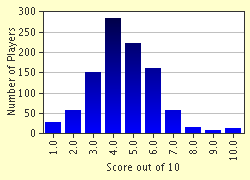Quiz Answer Key and Fun Facts
1. "I'm Joe Friday and I'm here to question the not so notable theologian, Tertullian Theophilus Ebenezer. Professor Ebenezer, how many times does the word "Trinity" appear in the Bible? Remember, Professor, just the facts." What is the correct answer to Friday's question?
2. Friday: "Thanks, Professor, for that clarification. Now, back in 325 AD a controversy arose that forced a church council called the Council of Nicaea. A letter from Arius to what other person started the controversy?" What answer should the professor give to this question?
3. Friday: "The documents in our possession indicate that Arius seized on verses in the Bible that Arius felt indicated that the Son was begotten. Arius said that this implied that the Son was created. But we can't figure out where the Word fits into all of this. Can you help us, Professor?" What should the professor say that Arius taught?
4. Friday: "Arius maintained that the Son was a created being. Did Arius teach that the Holy Spirit was also a created being?" How should the professor answer?
5. Friday: "Professor, I understand that an important part of the issue involved whether or not the Father and the Son actually consisted of the same substance. Is it true that the Greek term for consubstantiality differed from the term for mere similarity by only a single iota (iota being a Greek letter)?" Should the professor answer yes or no?
6. Friday: "Professor, my informants tell me that letters were written to Emperor Constantine, regarding the conflict between Arius, who held that the Son was less God than the Father, and those opposing his view. We also have reason to think you are familiar with the letter Constantine wrote to one Eusebius, expressing his opinion as to the conduct of those involved in the dispute. What did the Emperor Constantine say on this topic?" What should the professor report Constantine as saying?
7. Friday: "So, Professor, the conflict won't die down, and Constantine summons all the Bishops of the Church to meet with him at Nicaea. He even agrees to pay their expenses. We have accounts saying that at least 318 Bishops showed up. Arius insisted that the Son was a created being and 'divine only by participation.' When it came to a vote, exactly how many bishops supported Arius?" How should the professor answer this question?
8. Friday: "Professor, we have a copy of a document drawn up at the Council of Nicea called the Nicene Creed. It's common knowledge that Arius refused to sign it. Exactly how many other bishops also refused?" What should the professor answer?
9. Friday: "We've found mention in certain Catholic documents of someone termed, 'the shifty prelate of Nicomedia.' Apparently, this refers to one Eusebius, who is alleged to have baptized Emperor Constantine near the time of his death. Did this Eusebius refuse to sign the Nicene Creed?" How should the Professor answer this time?
10. Friday: "This wasn't the end of Arius' views, was it Professor? How was it that the famous historian Will Durant described it: "the most challenging heresy in the history of the Church?" Isn't that what Durant said, Professor?" How should the professor answer?
Source: Author
uglybird
This quiz was reviewed by FunTrivia editor
ArleneRimmer before going online.
Any errors found in FunTrivia content are routinely corrected through our feedback system.

